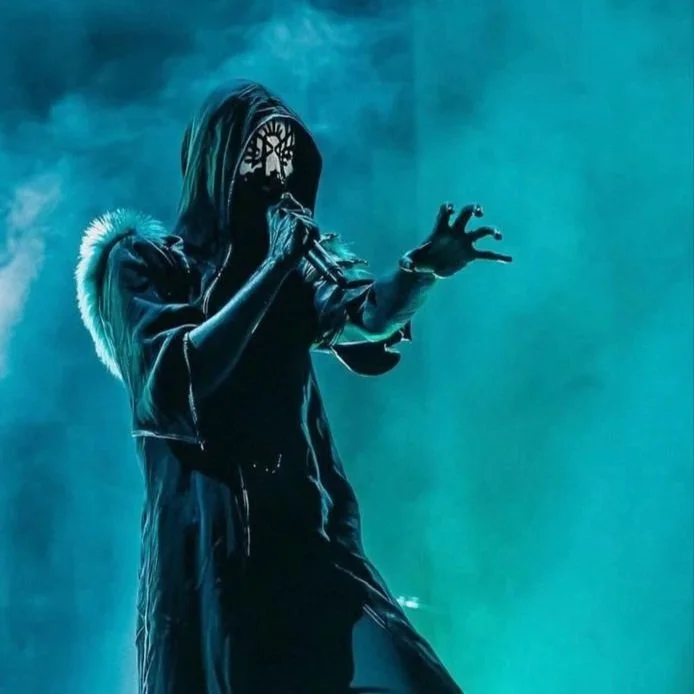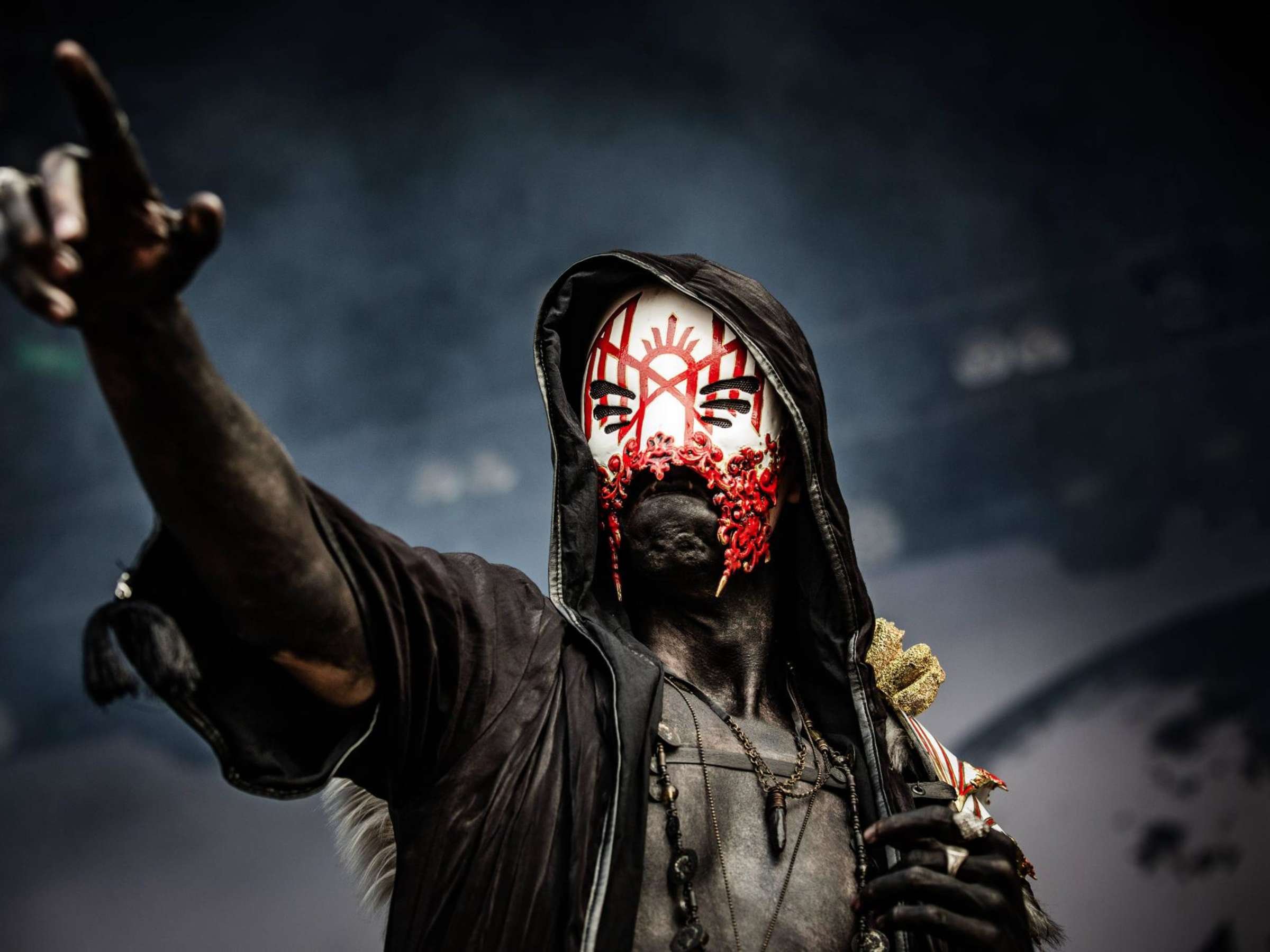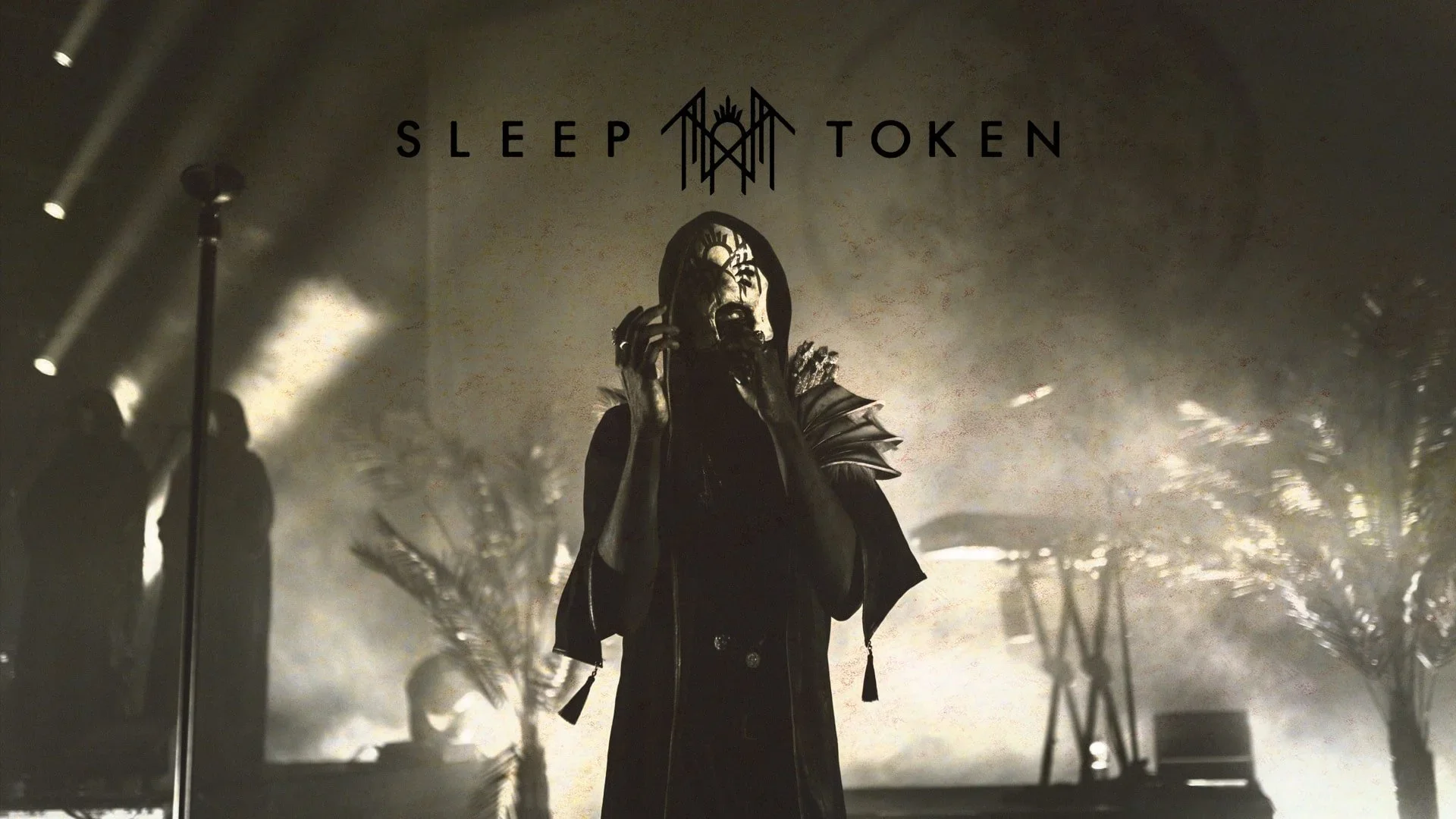Black Flamingo: “Et in Arcadia ego”
The new Sleep Token album, Even in Arcadia, which came out in May, is one of those rare records that feels bottomless, offering a new layer with every pass. I’ve been listening to it almost every day since its release, and I’m still not done with it.
As an artist driven to find a language for the unspoken and to create maps of complex emotional landscapes, I find the album's resonance with my work to be profound. Its exploration of inner turmoil, the dreamlike, and the fragmented nature of the psyche feels like a direct musical counterpart to the themes I confront in my own practice.
For those unfamiliar, Sleep Token is an anonymous, masked musical collective whose work is entirely built upon a core mythology. The frontman, "Vessel," is a worshipper bound in service to a goddess figure named "Sleep." The group’s first three albums detailed the beginning of their relationship, exploring devotion, suffering, and the cost of this pact.
Crucially, the band's anonymity isn't just a gimmick; it's a deliberate artistic choice—a filter that removes the ego and the cult of personality. This forces the music and its themes to be the only thing that matters, keeping the focus squarely on the psychological tension: the tension between the persona and the person.
The band's mythology extends to all its members, with the instrumentalists known only by their Roman numerals: II (Drums), III (Bass), and IV (Guitar). Their live performances are consequently referred to as "Rituals," not concerts, reinforcing the thematic framework. The release of Even in Arcadia has been visually marked by new masks, signifying a "new era" that is distinct from their previous trilogy of albums.
While the band’s entire narrative arc is often read as a raw, painful story of a toxic relationship, that interpretation feels incomplete. The band's intentional anonymity is the key: by presenting a masked figure known only as "Vessel," they create a mirror where listeners can project their own experiences.
My interpretation focuses on the true core of the struggle—and the focus of this album—as far more internal: a relentless dialogue with oneself. In this reading, "Sleep" is not an external deity, but a personification of Vessel's own pain, his struggles, and his psyche. Even in Arcadia becomes a detailed map of this internal landscape
The very title, Even in Arcadia, encapsulates this inescapable inner turmoil. 'Arcadia' is the classical ideal of paradise, a perfect, harmonious utopia. But the phrase is a direct allusion to the Latin warning, 'Et in Arcadia ego'—'Even in Arcadia, I am there.' In Baroque art, the 'I' is often understood to be Death. In the context of the album, this "I" is 'Sleep.' It's the shadow-self, the pain, the persona.
The title itself is a perfect summary of this psychological tension: even in paradise, the internal struggle—the shadow-self—is inescapably present.
The album's cover perfectly visualizes this concept. The image is a study in contradiction: a wall overflowing with lush, pink, utopian flora—the visual representation of 'Arcadia'—is contrasted by a single black flamingo standing at its base.
Flamingos derive their vibrant pink color from their diet in the environment.
A flamingo that belongs to this paradise should be pink. This one is black. It is the visual embodiment of 'Et in Arcadia ego.' The black flamingo is the shadow-self, the eclipse, the part of Vessel or Sleep that is present in the moment of paradise but fundamentally refuses, or is unable, to be absorbed by it.
It signifies that the struggle is always present, even in utopia.
This psychological tension is reflected not just visually, but also in the album's sonic landscape. The album explores this internal state by fundamentally rejecting any single genre. It lurches between crushing metal breakdowns, sparse piano ballads, R&B, and pop, often in the same song. This isn't just a stylistic choice; it’s the thesis. It’s a "testament to the idea that true art doesn't fit into a box; it creates its own." Because the anonymity prevents a focus on the individuals, the band is liberated from the constraints of personal celebrity—there is no brand to protect, no single genre to defend. They are free to use any sound necessary to serve the emotional truth of the song.
For this inner turmoil, this refusal to be categorized is the only honest form of portrayal. Human emotion isn't one genre. A mental struggle isn't a linear, three-minute pop song. It's chaotic, contradictory, and non-linear. It is the sound of a panic attack followed by a hollow silence. By refusing genre, Sleep Token's music becomes an effective container for the human experience—unburdened by ego or expectation, able to show every facet of the self at once.
The internal journey unfolds track by track.
It’s worth spending time with the opening song, 'Look to Windward.' The title itself is a nautical instruction: to look towards the source of the wind, to face what's coming. It’s a song about bracing for impact.
It opens not with a crash, but with a plea, a quiet admission of disintegration: "Will you listen / Just as my form starts to fission / Losing this war of attrition / Just as I drift away". It’s a state of being that is literally pulling itself apart, a "war of attrition" against the self. This establishes the entire conflict before the first chorus. The track is built around the central, repeated plea: "Will you halt this eclipse in me?". It's an "eclipse" of the self, a total blockage of light. This isn't just a question to a lover or a god; it's a plea to the self, to the "Sleep" persona, to anyone listening, to stop this internal collapse.
Lyrical repetition as a mantra, a technique first established in 'Look to Windward,' is employed by Sleep Token throughout the entire album. It continues immediately on the second track, 'Emergence.' The line "Go ahead and wrap your arms around me" is repeated with changing intensity. Surrounded by lyrics like, "You might be the one to take away the pain and let my mind go quiet," the phrase sits in a state of painful ambiguity. Is it a plea for comfort, or a total surrender to an all-consuming force? It blurs the line between a desire for love and a desire for oblivion.
Then, by the fifth track, 'Caramel,' the artifice dissolves. The persona of "Vessel" seems to rupture, and for a moment, you hear the unfiltered, vulnerable human behind the mask. It's a full confession of the cost of the persona: "This stage is a prison, a beautiful nightmare," and the pained admission, "I guess that's what I get for trying to hide in the limelight." It’s a direct confrontation with the paradox of being a masked figure, of the fame that comes from being unknown, and the exhaustion it causes: "Acting like I'm never stressed out by the hearsay." The mask has become the source of the conflict, not a solution. The song ends with the devastatingly honest, "I thought I got better / But maybe I didn't," which starkly captures the non-linear, painful reality of the struggle.
The album confronts this raw, human pain again later on in 'Gethsemane.' The title suggests a divine surrender, but the lyrics reveal a toxic dynamic, "Do you wanna hurt me? / 'Cause nobody hurts me better." It's less a plea to a god and more a confrontation with a very human, and internalized, source of suffering.
The album's structure is where the internal dialogue fully manifests as an inescapable trap. The album closes on 'Infinite Baths,' which at first feels like a moment of release. The song starts as an acceptance, a moment of peace. "Infinite baths / Washing over me at last... I've been running since I got here / But now I'm falling into Infinite baths."
But it’s a false ending. The second half of the song begins. The tone and feel undergo a profound reversal. "Sleep" returns, a distorted voice pulling Vessel back into the depths. The music swells, and the final lyrics of the entire album are a direct inversion of the first track. We hear the same line, "Will you halt this eclipse in me?," but this time, it's not Vessel's plea. It's Sleep's.
It’s a plea for Vessel not to leave, a desperate attempt to pull him back into that co-dependent struggle.
This cyclical structure is the trap, the album's argument for how this inner struggle perpetuates itself: a constant battle, looping back on itself with no apparent way out.
But it also offers a choice. As an observer, as a listener, you can participate in this structure, or you can choose to break it. If you start the album not on the first track, but in the middle, on the title track 'Even in Arcadia,' the entire narrative is reframed. You listen from that point forward, and eventually reach 'Infinite Baths.' You then experience the album's built-in cyclical transition as it flows directly into 'Look to Windward.' But because you've chosen a new entry point, the loop is no longer a loop. It's a path that now has a true conclusion. You continue through the rest of the album's first half, and the new final track of your listening experience—the track that now serves as the true end—is 'Caramel.'
By changing your entry point, you end the album on that moment of pure, unfiltered honesty—the very moment identified earlier where the human breaks through the myth. And in a deliberate, conscious choice, the cycle is broken. The final word belongs not to the myth or the god, but to that human admission.
And this is where the album's true power lies. That final line, "I thought I got better / But maybe I didn't," is not a confession of failure. It is acceptance. It’s the first and most critical step in any healing: to stop fighting, to stop telling a story of who you should be, and to simply observe, without judgment,
who you are.




